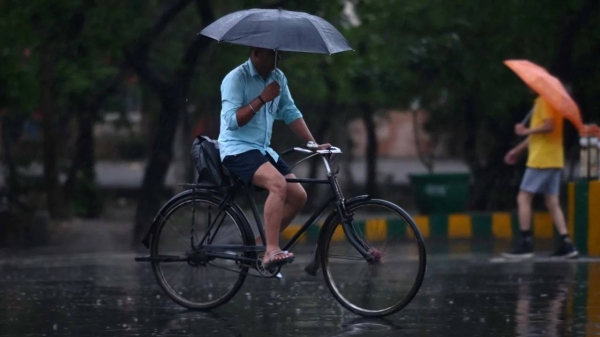
Dangerous heatwaves are engulfing parts of China, Europe, south-west and central US this week, as dozens of cities have found themselves dealing with soaring summer temperatures.
By Tuesday afternoon, at least 86 Chinese cities in eastern and southern parts of the country had issued heat alerts. Chinese meteorologists forecast temperatures in some cities would top 40C (104F) in the next 24 hours.
In Shanghai, China’s most populous city, the authorities have told its 25 million people to prepare for unusually hot weather. Since record-keeping began in 1873, Shanghai has had only 15 days with temperatures above 40C.
“This is too hot for July,” said Wang Ying, 35, who lives in Shanghai. “My air conditioning has been on the whole day today, and I don’t dare to venture out at all – even to my balcony.” She said she planned to work from home for the week.
Heatwave-related mortality has risen by a factor of four from 1990 to 2019, reaching 26,800 deaths in 2019, according to a Lancet study published in 2020. People aged 65 years or above face a 10.4% higher risk of dying during a heatwave, the study said. As a result, a number of Chinese cities are warning of the danger of such high temperatures to elderly people.
In the eastern city of Nanjing, one of China’s three “furnaces” notorious for their searing summers, city officials opened up underground air-raid shelters to local people since Sunday, with its wartime bunkers equipped with wifi, books, water dispensers and even microwave ovens.
In Chongqing, another furnace city, the roof of one of its museums melted, with the tiles of a traditional Chinese roof popping as the heat dissolved the underlying tar. The city raised a red alert on Monday.
High temperatures, humidity and ultraviolet radiation are also forecast to envelop the central city of Wuhan, the third furnace city.
Extreme weather is no longer surprising to those who have been following the climate trends in China, said Prof Faith Chan of the University of Nottingham in the eastern Chinese city of Ningbo. Last year, China was hit by massive floods.
“The reason behind this year’s heatwave is the two anticyclones, including the Western Pacific subtropical high from the sea and the one formed on the Persian Plateau which has moved to the Qinghai-Tibet Plateau,” Chan said.
In the US, south-west and central areas have been experiencing extreme heat, with 42.2C in Waco among more than a dozen daily temperature records broken at the weekend in cities in Texas, Colorado, Oklahoma and Arkansas.
A “heat dome”, an area of heat-trapping high pressure, has been blamed for the spike in what was already a hot summer. Texans sweltering under record temperatures and high humidity have been urged to conserve energy as the power grid struggles to cope with a rise in demand.
Temperatures in Texas are forecast to dip by the end of the week while rising in Arizona, reaching 45C in the state capital, Phoenix, on Friday.
In Europe, Spain is in the grip of its second heatwave of the summer, with temperatures in some southern and south-western parts set to reach or exceed 44C this week.
Rubén del Campo, a spokesperson for the state meteorological office, Aemet, said the heatwave, which began last Saturday, was expected to peak between Tuesday and Thursday but could stretch into the coming weekend.
“This will be an intense heatwave, and temperatures on the hottest days could reach or even exceed 44C in the Guadiana and Guadalquivir valleys and in cities such as Córdoba or Badajoz,” said Del Campo, adding that the Ebro valley and southern parts of the north-western region of Galicia could have temperatures of 42C.
As well as bringing a “very high risk of forest fires”, he said, the heatwave meant night-time temperatures in many places would be uncomfortably high.
“There will be torrid, tropical nights in some central, western and southern parts of Spain, when the temperature does not fall below 25C,” he said. “That means that at the time when most people usually go to bed – between 10pm and midnight – temperatures in some places could still be between 32C and 34C.”
Del Campo said that while the heatwave was not on course to match the 26-day one recorded in June and July 2015, nor the 16-day one of late July and early August 2003, it could rival previous hot spells for third place.
Although the first official heatwave of the Spanish summer, in mid-June, brought temperatures of up to 42C, parts of Spain had experienced soaring temperatures the previous month after the hottest May on record pushed the mercury past 40C in some areas.
Spain recorded its highest ever temperature last August, 47.4C in the Andalucían town of Montoro. In May, Del Campo told El País that the rise in temperatures was a “direct and palpable [consequence] of climate change … The climate in Spain isn’t the one we used to know. It’s got more extreme.”
Across the border in Portugal, temperatures topped 44C last weekend, fuelling wildfires, with vast smoke clouds visible in the capital, Lisbon. Firefighters brought the largest blaze under control on Monday after it burned through swathes of the central municipality of Ourém, local officials said.
While temperatures eased somewhat in Portugal on Monday, they were expected to soar again in the coming days, with 44C forecast for the south-eastern city of Evora.
“In the coming days we will experience conditions of maximum risk,” the prime minister, António Costa, said. “The slightest lapse in vigilance could result in a fire of significant proportions.”
A front of hot air began pushing into France on Monday, with the temperature above 30C across much of the country, according to the national weather forecaster, Météo-France.
It said temperatures on Tuesday could hit 39C in some parts of France, adding that the heatwave was expected to peak between Saturday and next Tuesday.












